| Srl | Item |
| 1 |
ID:
066398


|
|
|
| 2 |
ID:
038962
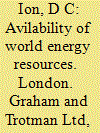

|
|
|
|
|
| Publication |
London, Graham and Trotman Ltd, 1975.
|
| Description |
234p
|
| Standard Number |
0860100154
|
|
|
|
|
|
|
|
|
|
|
|
Copies: C:1/I:0,R:0,Q:0
Circulation
| Accession# | Call# | Current Location | Status | Policy | Location |
| 016352 | 333.7/ION 016352 | Main | On Shelf | General | |
|
|
|
|
| 3 |
ID:
118138
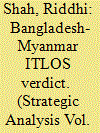

|
|
|
|
|
| Publication |
2013.
|
| Summary/Abstract |
The International Tribunal for the Law of the Sea (ITLOS) is a body set up under the United Nations Convention on the Law of the Sea (UNCLOS) to deal with disputes that emerge because of a difference in the interpretation and application of the convention. 1 Bangladesh has had an ongoing maritime boundary dispute with India and Myanmar since 1974. On 14 March 2012, the ITLOS delivered a verdict and ended the long-running maritime boundary dispute between Bangladesh and Myanmar.
In the current global world, energy resources are a crucial element for a nation's growth. India, Bangladesh and Myanmar are no different in this regard. India discovered 100 trillion cubic feet (tcf) of gas reserve in the Bay of Bengal (BoB) in 2005-2006. Soon after, Myanmar discovered seven tcf of gas reserves near the Rakhine coast. This discovery of colossal gas reserves sparked a claim-staking contest between the three countries in the BoB.
|
|
|
|
|
|
|
|
|
|
|
|
|
|
|
|
| 4 |
ID:
101181
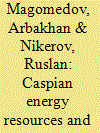

|
|
|
| 5 |
ID:
051068
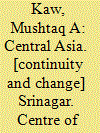

|
|
|
|
|
| Publication |
Srinagar, Centre of Central Asian Studies, University of Kashmir, 1999.
|
| Description |
267p.hbk
|
|
|
|
|
|
|
|
|
|
|
|
Copies: C:1/I:0,R:0,Q:0
Circulation
| Accession# | Call# | Current Location | Status | Policy | Location |
| 048003 | 958/KAW 048003 | Main | On Shelf | General | |
|
|
|
|
| 6 |
ID:
116605
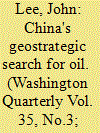

|
|
|
|
|
| Publication |
2012.
|
| Summary/Abstract |
In 2000, Asia analyst Robert A. Manning presciently argued that the likelihood of future conflict over energy resources would increase as rising Asian giants such as China shifted away from an economic toward a strategic approach to energy security.1 Since then, as China's energy consumption has expanded and its rise has become the dominant geopolitical issue of our time, Beijing's energy security policy has become one of the major discussion topics.
|
|
|
|
|
|
|
|
|
|
|
|
|
|
|
|
| 7 |
ID:
127478
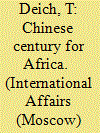

|
|
|
|
|
| Publication |
2013.
|
| Summary/Abstract |
IN RECENT YEARS, there has been a surge of international interest in Africa, not long ago known as the "forgotten continent." The world's leading countries have come to see this continent (a source of minerals and energy resources they so badly need) from a new perspective. An important factor fueling interest in Africa is the unprecedented expansion of "emerging powers" in African countries. This applies primarily to China, whose rapid economic growth induces it to double its efforts in world markets, pushing "old players" out of these markets.
|
|
|
|
|
|
|
|
|
|
|
|
|
|
|
|
| 8 |
ID:
110325
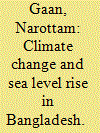

|
|
|
| 9 |
ID:
150609


|
|
|
|
|
| Summary/Abstract |
A Critically and comprehensive understanding of geo-politics and causes of ‘War on terror’ is the fundamental objective of this paper. It is an attempt to enquire into the causes of War on Terror to see with-in whether it is really so or it sued into enhancing the hegemony of west. Because, since the days of the cold war and even before, the tussle, conflict and war has been initiated and fought by the powerful states to establish hegemony
|
|
|
|
|
|
|
|
|
|
|
|
|
|
|
|
| 10 |
ID:
076702
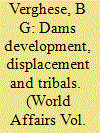

|
|
|
| 11 |
ID:
142718
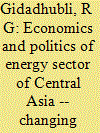

|
|
|
|
|
| Summary/Abstract |
Central Asia is one of the energy resource rich regions in the world. For the post-Soviet sovereign and independent Central Asian States (CAS), energy sector has assumed special political and economic significance during the last two decades. The leadership of the CAS has to deal with the geo-political influence of the global powers apart from the fact that their energy sector, being integrated with the global energy market, has also to deal with the cost and benefit of fluctuating international demand and price for oil.
|
|
|
|
|
|
|
|
|
|
|
|
|
|
|
|
| 12 |
ID:
127203


|
|
|
|
|
| Publication |
2014.
|
| Summary/Abstract |
The increases in a country's energy capacity are related to its gross domestic product (GDP). In Brazil, increases in income and the consumption of goods and services have led to an increase in the generation of solid waste (SW), which is sent to landfills as a method of treatment and final disposal. The purpose of this study was to facilitate an increase in energy generation from renewable resources, specifically from landfills via thermal biogas plants, and the research was divided into two phases. The first phase involved the assessment of the potential population size contributing to the landfill, which could result in the installation of a financially viable enterprise to generate electricity in Brazil. Next, an estimate of the costs associated with the generation and collection of solid waste in Brazil was predicted by GDP prognoses, the latter being in accordance with the National Energy Balance (Balanço Energético Nacional - BEN) plan created by the Mines and Energy Ministry of Brazil (Ministério de Minas e Energia do Brasil - MME). The net present value (NPV) and internal rate of return (IRR) of each enterprise scenario was used in the first stage to assess the plan's financial viability. In the second stage, estimation curves such as logistics, decreasing rate of growth, and logarithmic curves were used to establish relationships between the generation scenarios and the projected collection of SW and projected GDP. Thus, a range of possible landfill biogas/methane generation values and installed energy capacities were created, considering the extreme maximum and minimum values. These values were related to the energy sources from residual fuels reported by BEN. The results demonstrated that such values still represented a small percentage (0.00020% in 2010 and 0.44496-0.81042% in 2030) of the projected energy generation from residual fuels. Thus, an urgent need was identified to formulate policies that would encourage landfills as a source of renewable energy, broadening the number of financially viable initiatives for energy generation from landfill biogas for populations of fewer than 200,000 inhabitants.
|
|
|
|
|
|
|
|
|
|
|
|
|
|
|
|
| 13 |
ID:
038951


|
|
|
|
|
| Publication |
San Francisco, Siesra Clup, 1971.
|
| Description |
252p
|
| Standard Number |
871560550
|
|
|
|
|
|
|
|
|
|
|
|
Copies: C:1/I:0,R:0,Q:0
Circulation
| Accession# | Call# | Current Location | Status | Policy | Location |
| 013396 | 333.7/HOL 013396 | Main | On Shelf | General | |
|
|
|
|
| 14 |
ID:
156324


|
|
|
|
|
| Summary/Abstract |
Armen Oganesyan, Editor-in-Chief, International Affairs: Yury Konstantinovich, in its short-term forecast for the energy market in May, the Energy Information Administration of the U.S. Department of Energy, comes to the conclusion that oil production will grow faster than demand and the oil market will be oversupplied in the foreseeable future. Is this forecast correct?
|
|
|
|
|
|
|
|
|
|
|
|
|
|
|
|
| 15 |
ID:
087146
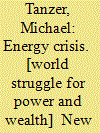

|
|
|
|
|
| Publication |
New York, Monthly Review Press, 1974.
|
| Description |
171cm.
|
|
|
|
|
|
|
|
|
|
|
|
Copies: C:1/I:0,R:0,Q:0
Circulation
| Accession# | Call# | Current Location | Status | Policy | Location |
| 014571 | 333.823/TAN 014571 | Main | On Shelf | General | |
|
|
|
|
| 16 |
ID:
116318
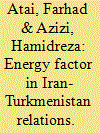

|
|
|
|
|
| Publication |
2012.
|
| Summary/Abstract |
The collapse of the Soviet Union brought about major upheavals in Central Asia and the Caucasus. Among the newly independent states, those that were endowed with energy resources set out on the path of economic growth. The energy resources in Central Asia also attracted outside powers to the region. Moreover, the status of these countries as landlocked, and Russia's monopoly over energy pipelines, led these countries to search for new partners in order to reduce their dependency. This added a new dimension to the political, economic and security equations of the region. In this article, Turkmenistan is studied as a former Soviet republic and Iran as a regional actor that has interests in the region's energy dynamics. The role of energy in the relations between Turkmenistan and Iran is examined. The article proposes that the energy factor has produced a favorable atmosphere for closer relations between the two countries. However, Tehran needs to overcome a number of challenges in expansion of its relations with Turkmenistan, the most important of which is the United States' effective opposition to any Iranian initiative in the field of energy in the region.
|
|
|
|
|
|
|
|
|
|
|
|
|
|
|
|
| 17 |
ID:
077796
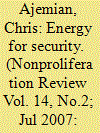

|
|
|
|
|
| Publication |
2007.
|
| Summary/Abstract |
Though North Korea agreed to partial denuclearization in February 2007, achieving that goal is at best a long way off. A natural gas pipeline linking all of Northeast Asia and promising energy and economic help could help convince the isolated nation to step away from its nuclear programs entirely; it could also provide the nonproliferation and energy security benefits that have eluded the region for so long. These economic benefits could motivate the other nations involved in the six-party talks to deal with North Korea more than if only nuclear reactors were offered
|
|
|
|
|
|
|
|
|
|
|
|
|
|
|
|
| 18 |
ID:
147546
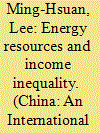

|
|
|
|
|
| Summary/Abstract |
Previous studies have investigated the factors underlying China’s income inequality. However, an important factor—the influence of natural resources—has been overlooked. To reinforce understanding of the factors contributing to income inequality in China, this study examines the role of energy resources in income inequality. This study established a 2005–10 provincial panel data set and adopted a dynamic panel data model with system GMM (generalised method of moments) estimators as empirical strategies. The results demonstrate that provinces that are more dependent on energy resources exhibit higher levels of income inequality and the findings are robust under different measures of income inequality.
|
|
|
|
|
|
|
|
|
|
|
|
|
|
|
|
| 19 |
ID:
061677


|
|
|
| 20 |
ID:
021134


|
|
|
|
|
| Publication |
March 2002.
|
| Description |
126-132
|
|
|
|
|
|
|
|
|
|
|
|
|
|
|
|